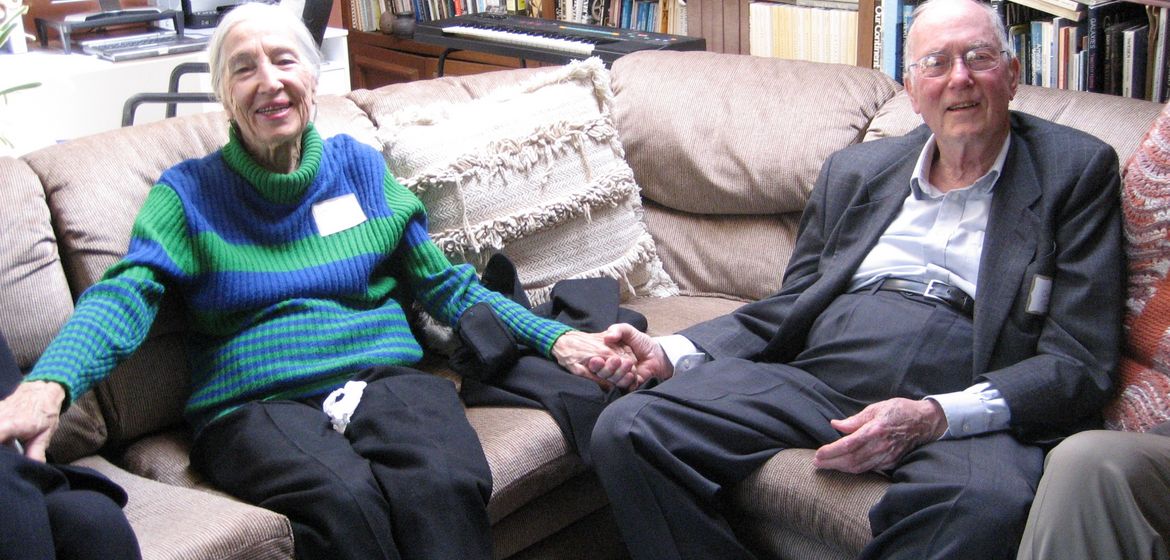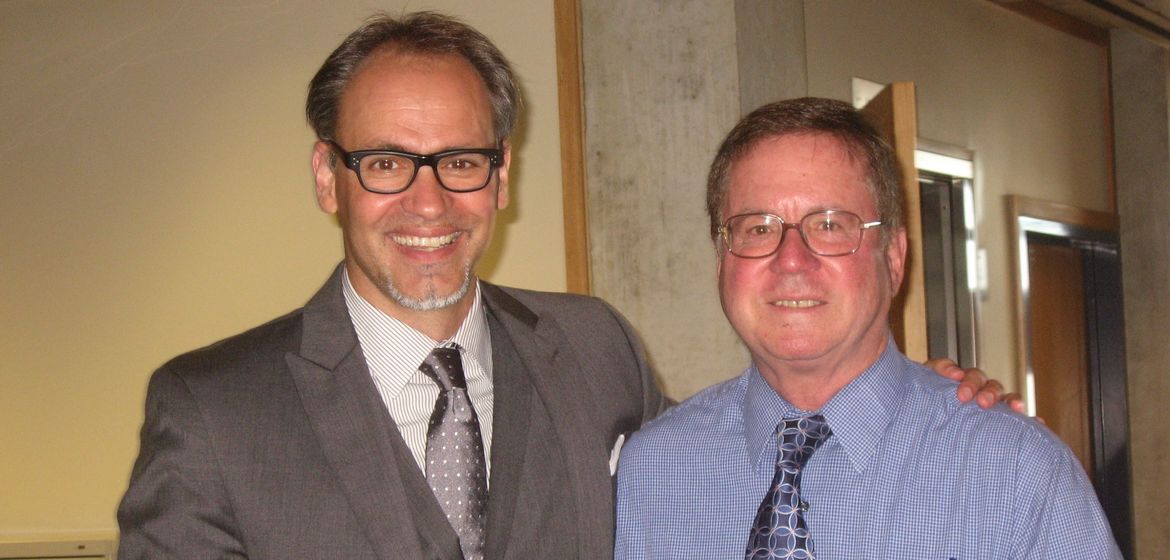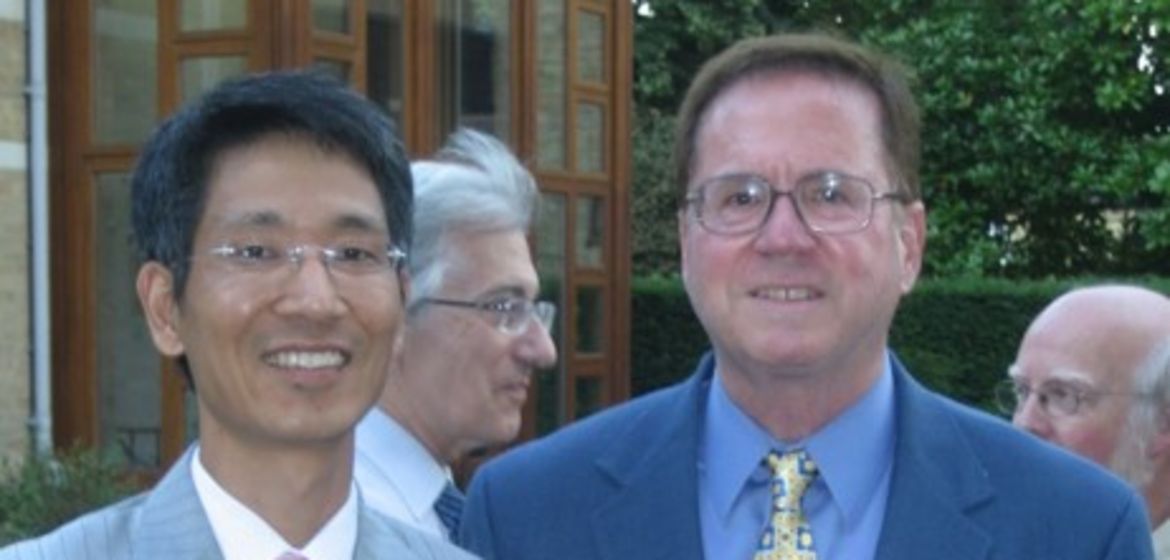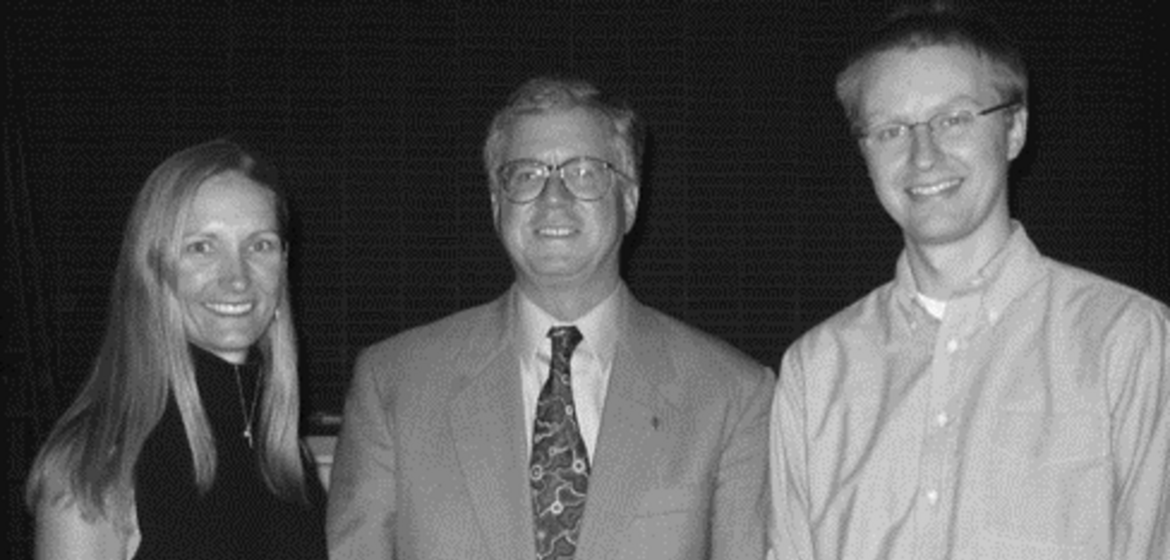The Charles H. Townes Graduate Student Fellowship
The Center for Theology and the Natural Sciences established the Graduate Student Fellowship in 2005, in order to help support doctoral students of academic excellence at the Graduate Theological Union working in theology and science.
The Fellowship was renamed the Charles H. Townes Graduate Student Fellowship on September 16, 2006 in recognition of Dr. Townes' work with physics graduate students at UC Berkeley and for his generous and longstanding support of CTNS. Dr. Townes was a Nobel Laureate in Physics for his role in the discovery of the maser and laser, Professor of Physics in the Graduate School at UC Berkeley and Templeton Prize Winner. Dr. Townes served on the CTNS Board of Directors for over two decades, he served on the Advisory Board of the CTNS Program Science and Transcendence Advanced Research Series (STARS), and he was a participating scientist in the CTNS Program Science and the Spiritual Quest (SSQ).
Charles H. Townes Graduate Fellowship application cycle
Current application cycle for the Charles H. Townes Graduate Student Fellowship is closed.
Eligibility: GTU Ph.D. student doing research in theology and science, comps proposal approved by Department.
Requirements: Submit a CV and a description of research (What we are looking for is the student to articulate the topic of their research, how it is embedded in science and religion, and what they hope to address/answer in their project.)
According to Robert John Russell, CTNS Founder / Director and Ian G. Barbour Professor of Theology and Science at the GTU:
“Charlie has been a champion of the intellectual validity and ethical voice of religion to an often skeptical and even dismissive scientific community. Charlie has been unremittingly outspoken in his conviction that science and religion are convergent rather than in conflict or in isolated realms. In particular, science should not be co-opted into the service of atheism and materialism but instead it should be celebrated as a lasting partner with religion in service to the wider global and interfaith culture. As a Nobel laureate in physics with over two dozen honorary degrees and as a member of such distinguished societies as the National Academy of Science and the Pontifical Academy of Science, Charlie represents the world of theological education in places where we could never go and to people who would never listen to us even if we got there.”
The CTNS Charles H. Townes Fellowship is for GTU doctoral students pursuing research in theology and science. Applicants need to have passed their Departmental comprehensive exams. The awards are given on the basis of academic merit and ability to do highly promising research on issues of theology and science.
By contributing to this fund you will help CTNS increase the amount of the annual gift to our extraordinary students. CTNS invites you to contribute to this student fund by donating here or mailing a check made out to GTU to:
CTNS - Townes Student Fellowship Fund
2400 Ridge Rd.
Berkeley, CA 94709 USA
Your donations to CTNS are tax-deductible.
Fellowship Award Winners
2024-2025: Charissa Jaeger-Sanders and Chang In Sohn
2023-2024: Donghwi Kim and Hyung-Joo Lee
2019-2020: Myoung-ho Sin
2018-2019: Hannah Pheasant and Andrew Younan
2017-2018: Levi Checketts and Seung Hyun Yoo
2016-2017: Jamie Fowler and KyungRae Kim
2014-2015: Ki Wook Min
2013-2014: Daekyung Jung and Mariusz Tabaczek, O.P.
2012-2013: John King, Sungho Lee and Alan Weissenbacher
2009-2010: Brian Green and Adam Pryor
2008-2009: Junghyung Kim
2007-2008: Braden Molhoek and Oliver Putz
2006-2007: Whitney Bauman and Joshua Moritz
2005-2006: Gaymon Bennett and James Haag
2004-2005: Nathan Hallanger and Nancy Wiens
Naming the Charles H. Townes Graduate Student Fellowship in Theology and Science
September 16, 2006
Robert John Russell
Founder and Director, CTNS
It is with great pleasure that I announce the naming of the CTNS Graduate Student Fellowship in Theology and Science in honor of Charles H. Townes. It is extremely rare for even a distinguished scientist, with a list of accolades a football-field-long, to accomplish something that changes the course of civilization. Yet Charlie Townes has done so with his participation in the discovery of the maser and the laser. From CD-players and bar-code scanners to cataract and cancer surgery and dentistry without anesthetics, from national missile defense and controlled nuclear fusion to optical fibers and lunar laser ranging, from laser desk-top printers to multimedia laser light shows, from identity holograms on credit cards to floating navigational holograms used by airplane pilots, the laser has forever changed the entire landscape of our world.
But what is of even greater importance for us, gathered here today to celebrate academic excellence in theology and science at the Graduate Theological Union, is that for years Charlie has been a champion of the intellectual validity and ethical voice of religion to an often skeptical and even dismissive scientific community. Charlie has been unremittingly outspoken in his conviction that science and religion are convergent rather than in conflict or in isolated realms. In particular, science should not be co-opted into the service of atheism and materialism but instead celebrated as a lasting partner with religion in service to the wider culture. Charlie has consistently voiced his conviction on an international stage. As a Nobel laureate in physics with over two dozen honorary degrees and as a member of such distinguished societies as the National Academy of Science and the Pontifical Academy of Science, Charlie represents the world of theological education in places where we could never go and to people who would never listen to us even if we got there. He has given energy, vision, and financial support to institutions seeking to bring science and religion into responsible and respectful dialogue, and he has addressed international audiences from Bangalore to UNESCO with the message that science can be a partner with religion in the quest for the ultimate meaning of life.
As Founder and Director of CTNS I am particularly honored to acknowledge and thank Charlie Townes for his two decades of faithful service on the CTNS Board of Directors. He has generously given of his wisdom, encouragement and support to the Board as a whole and to me personally as we have worked to expand the CTNS programs of research, teaching and public service in support of our mission: to sponsor the creative mutual interaction between theology and science. He was also an active participant in our international program of public outreach, “Science and the Spiritual Quest.” The CTNS and GTU communities are truly blessed that one of our colleagues moves so creatively between the theological academy into the austere turf of physics and cosmology to convey and to embody in his life and values our shared “good news” of hope and Christian faith.
It is therefore entirely fitting that the CTNS Board of Directors has voted unanimously to name the Graduate Student Fellowship in honor of Charlie H. Townes. The purpose of the Fellowship is to publicly recognize and offer modest financial support to doctoral students who have demonstrated the clear ability to do highly promising research on issues related to theology and science. The selection is based on academic excellence, and students in the GTU doctoral program whose research focuses on theology and science are eligible to apply. With the Fellowship carrying his name, its recipients will be inspired by Charlie’s pioneering leadership in scientific research and his internationally recognized voice for the creative interaction between science and religion.
In Memoriam: 1915-2015, Charles Hard Townes, outstanding scientist and international spokesperson for the convergence of science and religion
--by Robert John Russell
Charles Hard Townes was born in Greenville, South Carolina, July 28, 1915. At 19 he graduated from Furman University summa cum laude with majors in physics and modern languages. After a Masters degree at Duke University he completed his Ph. D. in physics at the California Institute of Technology in 1939. Following several years at Bell Labs he joined the physics department at Columbia University. There in 1951 he conceived the idea of a “maser” (an acronym for “microwave amplification by stimulated emission of radiation”), a device which triggers the release of coherent light from highly energized ammonia molecules. By 1958 he and Arthur Schawlow had extended this research to include visible light in what is now one of the most famous and ubiquitous denizens of the technological world, the “laser.” After serving as Provost of the Massachusetts Institute of Technology he was appointed University Professor at the University of California, Berkeley, in 1967, where he worked until his death on January 27, 2015. Throughout his career and continuing into his late 90s Charlie’s personal work ethic included six days a week and most evenings at the lab; Sundays were reserved for church, friends and family. He received the Nobel Prize in 1964, the Templeton Prize in 2005, and along with dozens of other prestigious prizes and honorary doctorates he was a Fellow of the National Academy of Sciences, a Fellow of the American Academy of Arts and Sciences, and he received the National Medal of Science in 1982.
So much more can be said in tribute to this extraordinary scientist. Yet it is extremely rare for even a distinguished scientist like Charlie Townes, with a list of accolades a football field long, to accomplish something that changes the course of civilization. Yet Charlie has done so with the discovery of the maser and, especially, the laser. From cd-players and bar-code scanners to cataract and cancer surgery and dentistry without anesthetics, from national missile defense and controlled nuclear fusion to optical fibers and lunar laser ranging, from laser desk-top printers to multimedia laser light shows, from identity holograms on credit cards to floating navigational holograms used by airplane pilots, the laser has forever changed the landscape of our technological world.[1]
But what is of even greater importance for those of us committed to the responsible dialogue between religion and science is that for all the decades of his scientific research Charlie has been a champion of the intellectual validity and ethical voice of religion to an often skeptical and occasionally dismissive scientific community. Charlie has been unremittingly outspoken in his conviction that science and religion are “convergent”, to use his favorite word for their relationship, rather than conflictive or isolated realms. He first wrote about science and religion in a now-famous 1966 article in the MIT journal THINK titled “The Convergence of Science and Religion.” He spelled out the structure of this convergence in “Spiritual Views from a Scientific Base,” a key chapter in his 1995 autobiography, Making Waves (American Institute of Physics publication).
According to Charlie, convergence is possible because science and religion share four factors in common: 1) The role of faith. “Faith is essential to science... Faith is necessary for the scientist to even get started, and deep faith necessary ... to carry out ... tougher tasks.” 2) The role of revelation. Instead of the popular view of the scientific method as strictly deduction from raw data to a complete theory, Charlie argues that scientific discovery requires insight, which like religious inspiration is laced with intuition, accident, and the joy of a “wonderful idea.” 3) The problem of proof. In science we can disprove our theories, but we can never prove them, displaying a remarkable similarity to religions ideas. And religion deals with “working hypotheses, tested and validated by experience,” not so different from science. 4) Limits of paradox and uncertainty. Knowledge in both science and religion is tentative, laced with paradox and constrained by limits.[2]
In essence, then, science should not be co-opted into the service of materialism and atheism but instead it should be celebrated as a lasting partner with world religions in service to the wider international culture. Over the years Charlie has consistently voiced this conviction on an international stage. As a Nobel laureate in physics, Charlie personally represents the world of theological education and the world’s faith communities in places where most of us could never go and to people who would never listen to us even if we got there. He has addressed packed audiences from Bangalore to UNESCO with the message that science can be a partner with religion in the quest for the ultimate meaning of life.
I have been privileged to know Charlie as a distinguished mentor and, now, dear friend since we first met nearly thirty years ago. Long before, I read his book on microwave spectroscopy[3] while I was an undergraduate in physics at Stanford University, and I used it in my doctoral research in low temperature microwave spectroscopy at the University of California, Santa Cruz in the 1970s. Still I first met Charlie not at a physics event but at church! It turns out that Charlie and his dear wife Frances, whom he married in 1941, regularly attended First Congregational Church of Berkeley, United Church of Christ. In 1982, after I returned from teaching physics at Carleton College, Minnesota, to the Bay Area, my wife Charlotte and I became members of FCCB. There I got to know Charlie. I was always struck by his boundless love of nature, his wondrous joy in the beauty of our universe, his quest to know and understand the laws of physics, and his deep appreciation of the sheer gift of life. It’s understandable that he worked such long days at the lab: he simply enjoyed doing physics, or as he would put it, “physics is fun!” Charlie was a person of inimitable modesty: “I only want to do something useful.” And though a truly extraordinary scientist, he was even moreso a person of deep and abiding faith: he longed to be known more as a man of faith in the Gospel of Jesus Christ than as a Nobel laureate in physics.
In 1987 I invited Charlie to join the Board of Directors of the Center for Theology and the Natural Sciences. Over the past twenty seven years he has served on the Board and he has given energy, vision, and financial support to CTNS. Thanks to his generosity we now have the annual Charles H. Townes Graduate Student Fellowship, which honors the best of our GTU doctoral students in theology and science.
In conclusion I believe that the international science and religion communities are truly blessed that one of our members has lived, thrived and triumphed for a century in the austere world of physics and cosmology to convey and to embody in his life and values our shared good news of hope and faith in God. And while his earthly journey is now ended, the journey to which he committed his life so faithfully and with such personal humility, good sense, and hope is ours to continue for his sake and for the sake of the wider world.
I pray that you rest well, Charlie, until we meet again, by the grace of God, in the coming New Creation.
Amen.
[1] See http://en.wikipedia.org/wiki/List_of_laser_applications
[2] I had the opportunity to respond twice in writing to Charlie’s thoughtful essay. See “An Appreciative Response to Townes on Science and Religion” in Amazing Light: A Volume Dedicated to Charles Hard Townes on his 80th Birthday, Raymond Y. Chiao, ed. (New York: Springer, 1996), p. 559-564. See also “The science of light and the light of science: an appreciative theological reflection on the life and work of Charles Hard Townes,” in Visions of Discovery: New Light on Physics, Cosmology, and Consciousness, Raymond Y. Chiao, Marvin L. Cohen, Anthony J. Leggett, William D. Phillips, and Charles H. Harper, Jr. (Cambridge: Cambridge University Press, 2011), pp. 751-769.
[3] Microwave Spectroscopy, C. H. Townes and A. L. Shawlow (republished by Dover Publications, 2012).












